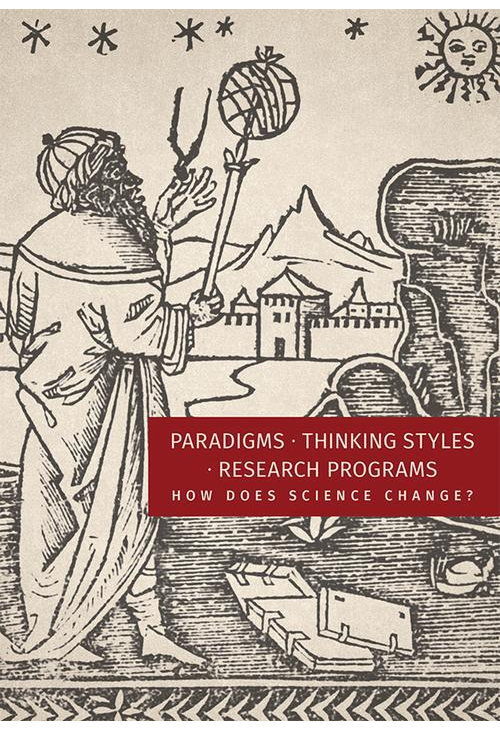
- -25%
ebook Paradigms. Thinking Styles. Research Programs. How Does Science Change?
Paradigms: Thinking Styles, Research Programs, How Does Science Change?
Autorzy: Lucyna Kostuch, Beata Wojciechowska, Sylwia Konarska-Zimnicka, Paweł Tambor
Wydawnictwo: Uniwersytet Jana Kochanowskiego
Rok wydania: 2020
Język publikacji: angielski
Nauka jako forma ludzkiej wiedzy zawsze dążyła do wyjaśniania przyczyn i mechanizmów zaobserwowanych zjawisk oraz opisywania ich w różnych aspektach. Zmiany, odkrycia i ustalenia w nauce towarzyszyły pojawieniu się nowych koncepcji teoretycznych i pomysłów, które wpływały na programy badawcze i style myślenia. W określonych warunkach społeczno-kulturowych procesy te kształtowały koncepcje i terminy w różnych epokach, tworząc paradygmaty poznania naukowego. Były one ważnym elementem dyskursu w wielu dziedzinach. Historia nauki odnotowała także znaczące momenty - radykalne i szybkie zmiany w paradygmatach, które według nomenklatury metodologicznej T. Kuhna można nazwać rewolucjami naukowymi. Niektóre programy badawcze cieszą się większą stabilnością, podczas gdy inne stają się mniej popularne. Celem niniejszej pracy jest:
- ukazanie różnorodnych możliwości badawczych i rozwojowych wielu koncepcji naukowych w ich historycznym kontekście
- ujawnienie mechanizmów leżących u podstaw zmian w nauce i ich przebiegu w przeszłości oraz teraźniejszości
- omówienie formowania się i funkcjonowania różnych idei, wartości i innowacji w przeszłości.
- szczególne zainteresowanie różnymi studiami przypadków zmian paradygmatów na małą i dużą skalę.
Chcemy, aby praca miała charakter:
- wielodyscyplinarny, szanujący odrębność metodologiczną nauk humanistycznych, przyrodniczych, teologicznych, filozoficznych i społecznych
- interdyscyplinarny, tj. badający możliwe relacje, które przekraczają tradycyjne granice między domenami wiedzy.
Dzięki temu ebookowi:
- odkryjesz złożoność zmian paradygmatów w nauce
- poznasz mechanizmy kształtujące rozwój myśli naukowej
- zainspirujesz się do badań interdyscyplinarnych
- poszerzysz swoją wiedzę o historii i metodologii nauki
Jeśli szukasz wartościowej lektury naukowej, która otworzy przed Tobą nowe horyzonty myślowe, to Paradigms: Thinking Styles, Research Programs, How Does Science Change? jest idealnym wyborem. Ten ebook w formacie PDF dostępny w sklepie z e-bookami pozwoli Ci czytać wygodnie na dowolnym urządzeniu elektronicznym, takim jak tablet, smartfon czy komputer. Znajdź ten ebook do pobrania i rozpocznij fascynującą podróż po świecie nauki!
Spis treści ebooka Paradigms. Thinking Styles. Research Programs. How Does Science Change?
Introduction ………………………………………………… 7LUCYNA KOSTUCH (Institute of History, Jan Kochanowski University in Kielce) Ancient and modern results of the observation of animal behaviour based on the fox. Between the humanist paradigm and the natural paradigm ….. 9
AGNIESZKA KIJEWSKA (Faculty of Philosophy, The John Paul II Catholic University of Lublin) The history of medieval philosophy and its historiography ……………. 27
BEATA WOJCIECHOWSKA (Institute of History, Jan Kochanowski University in Kielce) Blood science. From Galen to William Harvey – transformations of the paradigm until the end of the seventeenth century …………….. 43
SYLWIA KONARSKA-ZIMNICKA (Institut of History, Jan Kochanowski University in Kielce) From astronomy to astrology and back. Thoughts of a medievalist ……… 55
REV. PAWEŁ TAMBOR (Faculty of Theology, Faculty of Philosophy, The John Paul II Catholic University of Lublin) From a static Universe to an expanding Universe: a paradigm shift or a change in thought style? …………………………………. 71
YVES GASPAR (Trinity Hall, University of Cambridge, United Kingdom) A different universe – attempts to address the crisis of modern theoretical cosmology ………………………………………………. 91
ADAM ŚWIEŻYŃSKI (Institute of Philosophy, Cardinal Stefan Wyszyński University in Warsaw) From the ideas of spontaneous generation and cosmic origin of life to the bilinear concept of biogenesis ……………………………. 101
REV. ROMAN KULIGOWSKI A paradigm shift is not a shift of moral rules or values ………………. 127
Szczegóły ebooka Paradigms. Thinking Styles. Research Programs. How Does Science Change?
- Wydawca:
- Uniwersytet Jana Kochanowskiego
- Rok wydania:
- 2020
- Typ publikacji:
- Ebook
- Język:
- angielski
- Format:
- Liczba stron:
- 135
- ISBN dla wersji papierowej:
- 9788371338458
Recenzje ebooka Paradigms. Thinking Styles. Research Programs. How Does Science Change?
-
Reviews (0)

Na jakich urządzeniach mogę czytać ebooki?
- -25%















@CUSTOMER_NAME@
@COMMENT_TITLE@
@COMMENT_COMMENT@